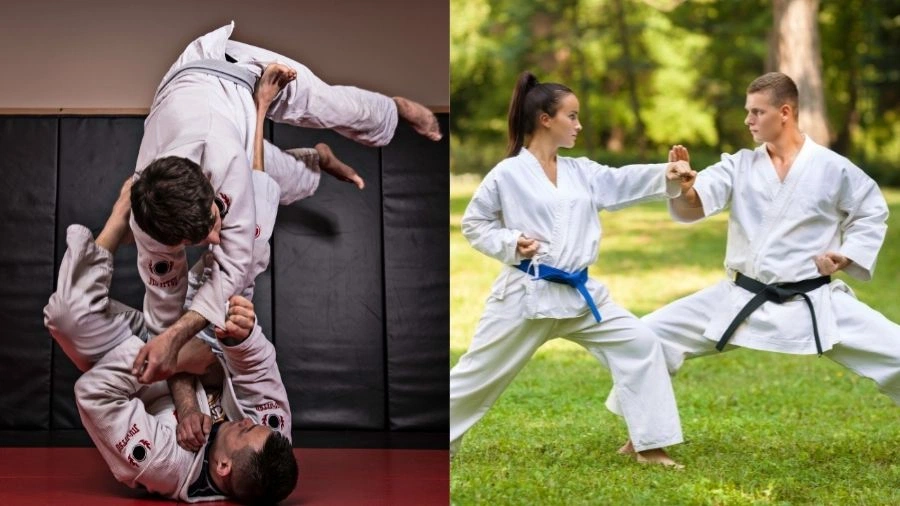Jiu Jitsu is a martial art that has been around for hundreds of years, and its popularity has grown significantly in recent years. Beyond being just a physical workout, Jiu Jitsu offers numerous mental and emotional benefits that can be particularly helpful for remote workers. In this article, we will explore the benefits of Jiu Jitsu training for remote workers, including how it can improve physical health, mental health, and work-life balance.
For remote workers, finding the right work-life balance can be a challenge. The lack of structure and social interaction that comes with working remotely can lead to feelings of isolation, stress, and burnout. Jiu Jitsu can be an effective way to counteract these negative effects. With its focus on physical activity, mental discipline, and community involvement, Jiu Jitsu can help remote workers build a sense of connection and belonging while improving their overall health and well-being.
Physical Health Benefits of Jiu Jitsu
Engaging in regular jiu jitsu practice has been shown to improve cardiovascular health, increase muscle strength and endurance, and decrease the risk of chronic diseases, all of which can lead to a longer, healthier life. This martial art involves intense physical activity, which helps burn calories and improve overall fitness levels. The Jiu Jitsu vs other arts comparison make your clarity better.
Additionally, jiu jitsu training focuses on injury prevention and increased flexibility through stretching and body conditioning exercises. The grappling techniques and ground fighting movements involved in jiu jitsu practice require a great deal of physical exertion, which can help build core strength and improve overall body coordination. By participating in this sport, remote workers can improve their physical health, which can lead to reduced absenteeism, increased productivity, and a better quality of life. Moving on to the mental health benefits of jiu jitsu, practitioners also experience a range of psychological benefits that can positively impact their work and personal lives.

Mental Health Benefits of Jiu Jitsu
The practice of Jiu Jitsu has been found to have potential positive effects on mental health. Stress relief is one of the most significant benefits of Jiu Jitsu. The physical demands of the sport help release endorphins, which are responsible for reducing stress levels. Another benefit is improved focus. Jiu Jitsu teaches practitioners how to be present in the moment and focus on the task at hand, which can have a positive impact on mental clarity and overall productivity. In addition, the practice of Jiu Jitsu has been found to increase mindfulness, which can help individuals better manage their emotions and improve overall emotional well-being. As a result, Jiu Jitsu training can be an effective tool for remote workers who are looking to improve their mental health and well-being. The benefits of Jiu Jitsu can not only improve individuals’ work performance but also their personal lives.
Work-Life Balance with Jiu Jitsu
Maintaining a healthy work-life balance is a crucial aspect of overall well-being, and incorporating physical activity such as Jiu Jitsu into one’s routine can be a valuable tool for achieving this balance. Jiu Jitsu requires a high level of self-discipline, which can translate into a more structured and productive work schedule. Additionally, the practice of Jiu Jitsu allows for building a community of like-minded individuals who can offer support and motivation in both personal and professional aspects of life. Whether it’s attending regular classes at a gym or training at home, Jiu Jitsu can be an effective way to improve work-life balance and overall well-being. In the next section, we will discuss how to get started with Jiu Jitsu training at home.
Getting Started with Jiu Jitsu Training at Home
For those looking to partake in Jiu Jitsu training from the comfort of their own homes, the following section provides practical tips and guidance to help establish a successful at-home practice. The first step is to invest in the necessary equipment, such as a quality Jiu Jitsu mat, resistance bands, and a grappling dummy. These items will allow for safe and effective training sessions at home. In addition to equipment, online resources can also be a valuable tool for at-home training. Many reputable Jiu Jitsu academies and instructors offer online classes and tutorials, providing remote workers with the opportunity to learn from experienced professionals and continue to improve their technique. With the right equipment and online resources, remote workers can successfully incorporate Jiu Jitsu training into their daily routine and reap the many physical, mental, and emotional benefits that come with the practice.
Conclusion
Jiu Jitsu training offers numerous benefits to remote workers, including physical and mental health advantages, as well as a potential improvement in work-life balance. Engaging in this martial art can help remote workers stay active and maintain a healthy body, as it involves a variety of physical movements and techniques. Moreover, Jiu Jitsu training can also help reduce stress and anxiety, leading to an overall improvement in mental health.
In addition to these benefits, Jiu Jitsu can also help remote workers achieve a better work-life balance. By setting aside time for training, individuals can establish a routine that allows for regular exercise and relaxation. Furthermore, Jiu Jitsu training can provide a sense of community and connection with others, particularly important for remote workers who may feel isolated or disconnected from colleagues.
In conclusion, Jiu Jitsu training can be a valuable addition to the routine of remote workers, providing both physical and mental health benefits, as well as opportunities for social connection and improved work-life balance. As the saying goes, “a healthy body leads to a healthy mind,” and Jiu Jitsu can serve as an effective means for achieving both.
You May Also Like:
